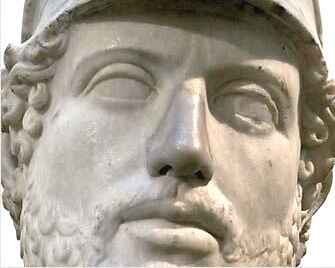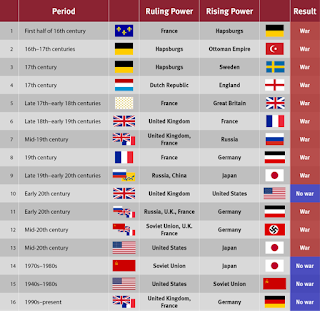Thucydides Roundtable, Book II: Treason makes the historian
Tuesday, November 8th, 2016[by Lynn C. Rees]
Curious how many top tier historians of classical antiquity were quislings:
- Herodotus: an exile from Halicarnassus, a city ruled by an oligarchy of Persian puppets, who turned into an unabashed booster of Athens.
- Thucydides: an exile from Athens, a city ruled by democrats, who turned into an abashed booster of the oligarchic Peloponnesian League.
- Xenophon: an exile from Athens, a city ruled by democrats, who turned into an unabashed booster of the Peloponnesian League.
- Polybius: a hostage from the Achaean League, which superseded the Peloponnesian League, who turned into an abashed booster of the Roman Republic.
- Titus Flavius Josephus: an exile from Judea who, after being captured a Roman army led first by future princeps Titus Flavius Vespasianus and later by future princeps Titus Flavius Vespasianus, turned into an unabashed Roman booster so boosterish that he changed his name to that of his patrons, one of many Flavians to come.
These men probably didn’t see themselves following in Vidkun’s bloody footsteps. They remained loyal to a political community of their birth, just not the flesh and blood political community of their birth. They pledged allegiance to a nation in being that remained moored just over the horizon in the Scapa Flow of their imaginations, waiting for Der Tag of political change.
Donald Kagan has pointed out that the Athenian quisling Thucydides’ terrifying silences and omissions are as important to an informed reading of The History of the Peloponnesian War as what he directly writes about. Though much of Kagan’s most recent distillation of his argument in Thucydides: The Reinvention of History is an indirect refighting of that war in Iraq his boys and daughter-in-law got mixed up in, it makes some valid arguments.
Thucydides went out of his way to frame such subjects like how a series of separate contests were one single war (since Thucydides was in exile for most of its length), how deranged the war policy of the Athenian democracy was (since it had exiled Thucydides), how enlightened the war policy of his fellow aristocrat Pericles had been (since Thucydides admired him), and how clever the Spartan Brasidas was (since he’d been responsible for the defeat that led to Thucydides’ exile). Kagan gathers enough information from other sources about the time and Thucydides himself to plausibly argue Thucydides’ narrative was somewhat skewed to fit his personal agenda.
How human.
There may have been no single “Peloponnesian War”. You could plausibly treat each of the conflicts that Thucydides lumps together as distinct wars that should be studied individually rather than as a group. Or you veer all the way to the other extreme and portray every Athenian-Spartan war between 460 B.C. and 387 B.C. as a single “Hundred Years War”-type conflict. The “Second Peloponnesian War” is a narrative convenience invented by Thucydides for his polemical needs.
Similarly, the military strategy pursued by Cleon and other demagogues that Thucydides despises for their policies, social class, and (oh yes) his exile was far more successful than the military strategy pursued by the sainted Pericles that Thucydides so strongly support. Conceptually, the Sicilian expedition was not doomed to inevitable ultimate failure. A twist of fate here, a twist of fate there, and it might have succeeded. Its eventual defeat was a near run thing in any case. Much more risky military expeditions have been attempted and succeeded against much greater odds.
Thucydides is lauded for his realism. Indeed, his history is a cold shower of corrections to many contemporary delusions. Thucydides shows us democracies fighting each other in spite of MacDonalds in both Athens and Syracuse. He shows us Athens intervening in the affairs of other Greek poleis to overthrow oligarchies and install democracies. He shows us Sparta intervening in the affairs of other Greek poleis to overthrow democracies and install oligarchies. He shows us civilization reduced to primal savagery, the foolishness of men, and a cynical game of political musical chairs.
But, like many avowed realists, Thucydides is a closet romantic. Like the leadership of his Spartan, Corinthian, or Theban hosts or any clique of fellow Athenian nobles at home, Thucydides believed in rule by “the best” (aristoi) as the cure to all problems. This recurring theme, passed down to us by Thucydides, Socrates, and younger Athenian contemporaries like Xenophon or Plato, holds that, given enough educated, well-bred, well-intentioned, and well-groomed men, no political problem is insurmountable. Handing rule over to the mob only condemns society to insurmountable foolishness.
However, history testifies that moving from rule by demagogues to aristocrats doesn’t guarantee either a gain in wisdom or a loss of foolishness. It only rearranges the chairs on the deck, moving the source of foolishness from one group to another. The same human stupidity behind the foolishness of the crowd haunts the human stupidity of the elite. The best laid plans of the “best and brightest” will be as thwarted by the stupidity of the “best and brightest” as the passions of the mob are thwarted by the mindlessness of the crowd. Rule by the “best” is as prone, if not more prone, to epidemics of destructive foolishness as rule by anonymous peons in a mobocracy.
Pericles’ finest hour was made possible by luck, a fortuitous swing in the politics of Megara in a pro-Athenian direction. Control over the Megarid during the “First Peloponnesian War” let Pericles keep Peloponnesian armies from reaching Attica to ravage Athenian territory. His worst hours were made possible by a less fortunate swing in the politics of Megara, this time back in a pro-Spartan direction. Loss of control over the Megarid reopened Attica to Peloponnesian ravaging in Peloponnesian War I and II. Pericles defended the Athenian people against this ravaging by gathering them inside Athens’ Long Walls. This protected them from the Peloponnesians but, crowded in as they were, they were now vulnerable to the plague that eventually killed Pericles himself, along with many of his fellow citizens.
In the end, Pericles’ luck in war was no better than that of Cleon, Alciabides, or his other successors. But, through Thucydides’ “possession for all time”, Pericles’ luck in history has far transcended the usual fate of small regional conflicts 2,500 years ago.





